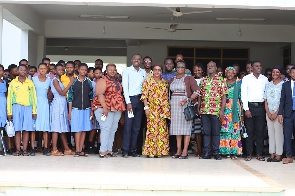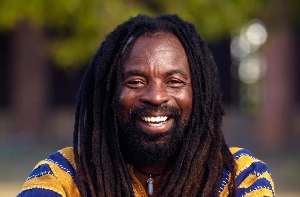Kingsley Obeng-Kyereh, the Executive Coordinator of the CYIB Curious Minds, has
stressed the need for inter-generational collaboration and partnership building in addressing society’s most pressing challenges to achieve the Sustainable
Development Goals (SDGs).
He said there was a need for partnership between younger and older generations as no one in this generation can do it all.
Obeng-Kyereh said this in Wa on Thursday, August 3, 2023, during an Inter-Generational Dialogue Colloquium held by the Children and Youth in Broadcasting (CYIB) Curious Minds, themed “Eliminating Harmful Practices for Sustainable Development.”
He indicated that the importance of partnerships could not be overemphasised if the world was to achieve the Agenda 2030 in that, the first and last goals of the SDGs and the erewhile Millennium Development Goals (MDGs) both consciously targeted poverty reduction and partnership building respectively.
“You realized that if we have to achieve all that we’re talking about, then it means that we should be working together: partnerships matter a lot”, he said.
He, however, observed that the concept of partnership building in the achievement of the SDGs is often misconstrued by both adult and younger generations which he said, was adversely affecting progress in attaining the SDGs.
“When we talk about children’s rights in this partnership, occasionally, some of us get it wrong, both adults and children. Some children would think that it’s what guarantees them the right to do everything they want and nobody should stop them”.
“And some adults also think it’s what makes children unruly so that they don’t respect and don’t listen to anything that adults are saying. On both fronts, you may be wrong if you consider it that way”, he explained.
He, therefore, stated that adults, stakeholders, and children need to find a common ground, where both parties are understood, to support each other in the execution of the development agenda.
“In this area, young people cannot do all that they want to do on their own, it may be positive, and when the adults or those we call duty bearers are also working, they can’t do it completely”.
“It needs to come together, and a lot of understanding between the different generations, so that when we are working together, we understand ourselves in tandem, we know we’re heading towards what we call development”, he added.
Speaking at the colloquium, Charity Batuure, the Upper Regional Director of the
Department of Gender observed that most cases of sexual and gender-based violence (SGBV) that came to the attention of her outfit were those involving close family relations and their victims, the phenomenon she described as worrying and worthy of paying critical attention.
“We’ve realized that issues of sexual and gender-based violence that come to our notice are those that happen between people that we’re familiar with; those are the people that appear in disguise: this is an uncle, this is a brother, this is a cousin, he will not do anything bad to me, we’re just family”, she said.
She urged young people who are being abused sexually or subjected to any form of
violence, to not keep quiet but speak for help.
“It’s time to speak out because your silence means that you’re causing harm to yourself and the next person, because when that brother, that cousin or whatever moves from you, he’s going to the next person”, she noted.
She also urged young people to take responsibility for their lives and whatever that happens to them as she emphasized the need for young people to recognize the responsibilities that come with the right to bodily autonomy.
On her part, Pognaa Rosemary Bangzie, the Upper Regional Adolescent Reproductive Health Focal Person indicated that the rate of adolescent pregnancies in the region has experienced a steady decline since 2021.
She indicated that the Upper Region followed behind Greater Accra Region with the lowest percentage of adolescent pregnancies of 8.5% as per the 2023 half-year review data as against 11.5% and 10.8% in the 2021 and 2022 half-years respectively.
The event which brought together over 200 young people had in attendance, M.D. Bayuo, a deputy director at the Upper West Regional Coordinating Council; Janet Kpan, Girl Child Education Officer of the Ghana Education Service, Civil Society Organizations (CSOs), traditional authorities, and other significant people.
Regional News of Thursday, 10 August 2023
Source: Aminu Ibrahim, Contributor

















